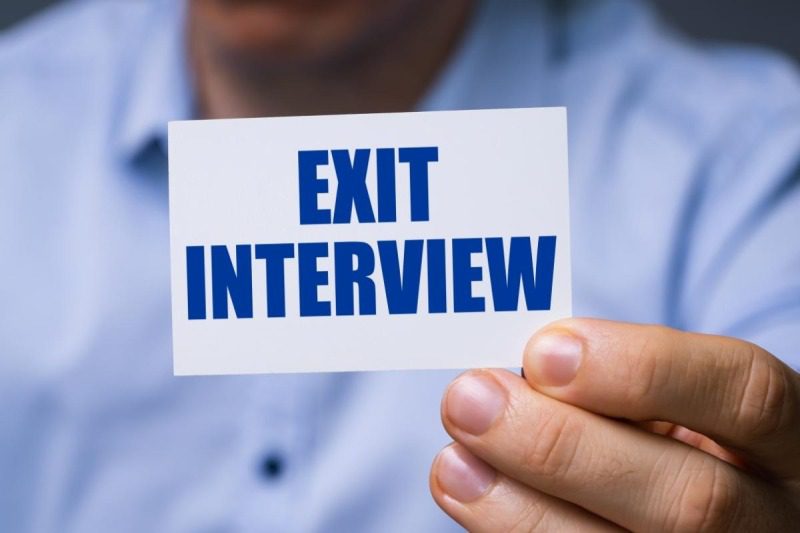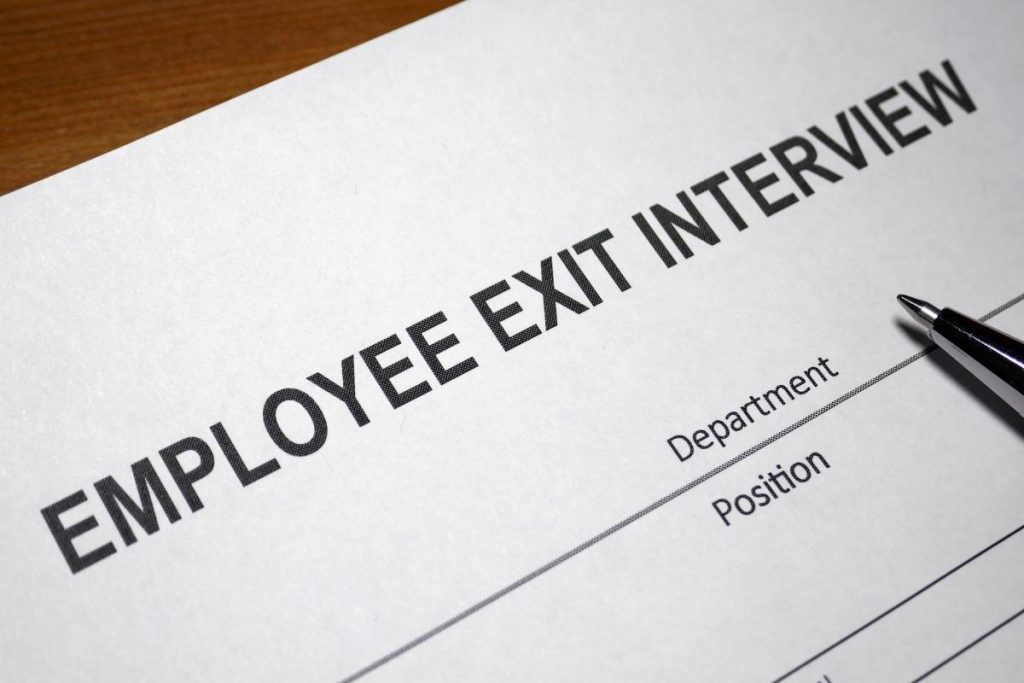
If you are an employer that has an employee leaving or you are the employee leaving your job, then the term exit interview might have been thrown around a few times.
It might seem strange at first, to interview the person leaving your company or to be interviewed when leaving a company. However, they are extremely important for assessing work culture.
If you want to find out more about exit interviews, what the purpose of one is, and what you can expect from an exit interview, then you’ve come to the right place.
Table of Contents
- What Exactly Is An Exit Interview?
- What Is The Importance Of An Exit Interview?
- The Types Of Questions To Expect During An Exit Interview
- Why Are You Leaving This Position?
- What Made You Accept Your New Job?
- Do You Feel You Had The Necessary Tools To Help You Do Your Job?
- What Is Your Relationship With Your Manager?
- Can You Describe The Culture Of The Company?
- What Did You Like/Dislike About Your Job?
- Would You Consider Staying?
- Would You Recommend This Company To Those Looking For A Job?
- How To Prepare For An Exit Interview
- Final Thoughts
What Exactly Is An Exit Interview?
Exit interviews are becoming an increasingly popular procedure and are the standard procedure before leaving the workplace. So, what is it?
An exit interview is an interview conducted by the employer to the employee. The employer will ask the employee questions to determine the reasons for leaving the company.
Not only does the employer ask about why the employee is leaving, but they also ask questions about the employee’s time in the workplace.
So an exit interview is an interview between the employer and employee before the employee exits from that job, hence the name exit interview.
What Is The Importance Of An Exit Interview?
We’ve discussed briefly that the purpose of an exit interview is to understand the reasons the employee is leaving and their experience in the company. That is why they are so important to conduct.
The great thing about exit interviews is that they are a fantastic way to know about the issues employees have with their company.
Employees that are leaving their companies are more likely to be honest, and open about their experiences and issues. That is why conducting an exit interview is so important. It can help employers to understand the status of employee morale within their organization.
Exit interviews are also important to have because they can help maintain positive relationships with the employees leaving the organization.
Allowing employees to share their experiences without judgment can make them feel like their voices are heard and that their well-being at the company matters to the employers.
It gives them the opportunity to give employers some feedback which in turn can make them feel better about leaving.
It also provides them with a chance to talk about any other issues or obligations that they may have with their employer.
This could be about the current non-compete clause they might have in their contract. It also gives them the chance to ask for a letter of recommendation.
Exit interviews will give employers the necessary information they need to make changes. They can identify areas in your company that need immediate attention and action. This then reduces the risk of fallout.
Conducting exit interviews is the perfect chance for employers to rethink the structure of their organization. This could mean looking at training opportunities for management or even changing the process of recruiting.
When employers understand the reasons that employees want to leave, they can try and make changes to prevent other employees from leaving for the same reasons.
The Types Of Questions To Expect During An Exit Interview
There are a few questions that can be expected when employees go for an exit interview. Here are some examples so that employees can prepare.
Why Are You Leaving This Position?
This question is almost guaranteed to be asked to the employee that is leaving the company. It is a vital part of the employer gaining some insight as to why employees might leave the company.
For employees responding to this question, it is important to be honest about your reason so your employer has the chance to make the necessary changes in their organization.
What Made You Accept Your New Job?
This is similar to the previous question, but instead, the focus is what does the new job have to offer that the current job doesn’t.
This question is so the employer can understand what is inviting about their competitors. Employees might have accepted the new job because they have been offered a better salary. This might prompt the employer to re-evaluate the current salary they are offering.
Do You Feel You Had The Necessary Tools To Help You Do Your Job?
This question is often asked to help employers understand whether employees feel confident about the jobs they are required to perform. Employers might assess their current training for employees depending on the employee’s answer.
The employee that is answering this question should be honest about their experience but not vent about the failures of the company and employer.
What Is Your Relationship With Your Manager?
This question might be in a few different forms. Employers might ask employees to describe the relationship between them and their manager. This question is to highlight any issues with management.
Employers might follow up this question by asking whether the employee discussed leaving their position with the manager.
Can You Describe The Culture Of The Company?
This question helps employers to understand the morale of employees in their company. It also helps to highlight any issues that need to be addressed immediately within the company.
What Did You Like/Dislike About Your Job?
It is important for both employees and employers to reflect on the positive aspects of the job as well as the negatives.
By having employees provide detailed feedback about what they loved and what they hated, employers know what they need to improve and what they should keep the same.
Would You Consider Staying?
After having an open discussion with the employee, some employers might ask if the employee wants to stay, depending on the changes they have to offer them.
For the employees to answer this question if your answer is no, then be honest about your reason for not staying. Answer this question in a positive way.
Would You Recommend This Company To Those Looking For A Job?
This is a chance for employers to see the impression that working for this company has left on the employee.
Employees that are answering this question should be open about if they would or would not. However, they shouldn’t vent or be harsh with their answer.
How To Prepare For An Exit Interview

There are certain things that employees should do before they enter an exit interview. Here are some of the do’s and don’ts for exit interviews.
Do Prepare Your Answers Before
This will give you the chance to clearly state what you are thinking and feeling. Preparing your answers will help you not get flustered or caught off guard.
Don’t Vent
It is important that as an employee you do not vent at your soon-to-be previous employer. By venting, you are more likely to cause offense and burn bridges between you and this employer. This could have negative consequences on future prospects.
Do Express Gratitude
It is best to leave things on a positive note with employers. So stating what you are thankful for or the positive experiences you have had when working there will help maintain a good relationship with this employer.
Don’t Talk About Your New Job Too Much
It is best not to gloat about your new job since that is not beneficial to both you and your employer. Only discuss your new job when it is relevant.
Do Provide Facts
The point of an exit interview is to help your employer understand why you are leaving and to share your thoughts about the company.
Therefore, try to share facts or details about specific things that made you want to leave. This could be sharing facts about your salary compared to other companies.
Final Thoughts
Exit interviews are a formal discussion between the employer and the leaving employee about their time in the company.
Exit interviews are supposed to be a helpful meeting so that both employer and employee gain something from the interview.
Employees are meant to feel heard and given the chance to discuss some of the issues. Employers are supposed to gain insight into the company and how employees are feeling.
Both employers and employees have an important role to play in exit interviews. For a successful one, it is important that both parties remain positive and open to the conversation.









